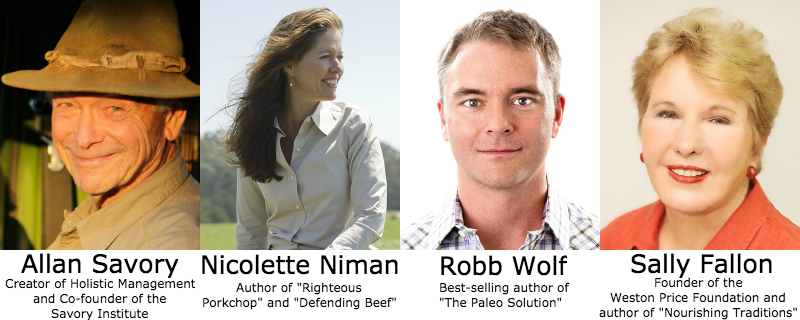We all know we feel better eating local, in-season, traditional foods, but what about the environmental impact of such a diet? Your friends and family might quote The China Study or Forks Over Knives when you mention your traditional diet rich in grass-fed animal protein. Questions of land degradation, climate change, methane emissions, and water quality issues invariably come up. The reality is that such data is drastically skewed by numbers that come from CAFO feedlots and are then extrapolated to be the same for grass-based livestock production when these two systems in practice couldn’t be more different.
We know that at previous points in history drastically more grazing animals existed in wild roaming herds and the planet did not suffer from the negative issues of climate malfunction and land degradation that are pinned on livestock today. This doesn’t mean that all grazing is inherently good. Livestock, like any tool, must be properly managed to achieve success.
Under the Holistic Management framework, working lands of all types dramatically improve, with increased soil organic matter, improved water holding capacity, greater productivity, and biodiversity. The holistic management movement is about real people with dirt under their fingernails and families to feed, people unified by a love of the land, a desire to understand nature’s rhythms and cycles and the magical beauty of abundant life in the soil. These are people that want security for their children, prosperous landscapes, and a life filled by a deep personal connection with nature. So don’t miss this special opportunity and come be a part of this once in a lifetime event.
At the Savory Institute’s “Artisans of the Grasslands” conference, attendees will get an in depth look at the success taking place across the globe, thought leaders will be showcased, on the ground practitioners will be celebrated, and the most up-to-date science in regards to carbon sequestration and the potential of the soil will be presented. Attendees will leave with an understanding of how to defend their lifestyle and be plugged into a network of fellow supporters from a wide-array of disciplines. Let’s not forget that it only makes sense that human health would correlate with healthy landscapes. The healthy food and environmental restoration movements must come together to create the change needed for humans to flourish.
Please note: Early Bird registration (which can save you $100) ends July 6th.
Go here for more information and to get tickets!
Speakers:
Allan Savory – Founder of Holistic Planned Grazing
Anya Fernald – Co-founder and CEO of Belcampo Meat Co and regular judge on Food Network’s Iron Chef America
Brock Dolman – Co-founder of Occidental Arts and Ecology
Bryan Welch – CEO of B The Change Media
Colin Seis – Developer of Pasture Cropping at Winona Ranch in Australia
Courtney White – Co-founder of Quivira Coalition and author of Grass, Soil, Hope
Dr. Cindy Daley – California State University Chico
Finian Makepeace – Kiss the Ground
Fred Provenza – Professor Emeritus of Behavioral Ecology at Utah State University
Jared Stone – Author of “Year of the Cow”
Jonah Sachs – Author of “Winning the Story Wars” and co-founder of FreeRange Studios famous for their animations like “The Meatrix” and “The Story of Stuff”
Judy Schwartz – Author of “Cows Save the Planet”
Kat Taylor – Co-founder of TomKat Ranch and CEO of Beneficial State Bank
Kelly Mulville – Paicines Ranch
Nicolette Hahn Niman – author of “Righteous Porkchop” and “Defending Beef”
Robb Wolf – New York Times best selling author of “The Paleo Solution”
Sally Fallon Morell – Founding president of the Weston A. Price Foundation
Sara Scherr – CEO of EcoAgricultural Partners
Tom Newmark – Co-owner of Finca Luna Nueva Farm in Costa Rica and co-founder and chair of The Carbon Underground
Woody Tasch – Founder and Chairman of Slow Money
And many more….


i couldn’t agree more, every time a farmer puts a plow into the ground he releases carbon.
Would love to attend but just not possible
Be sure to have one of these out east.